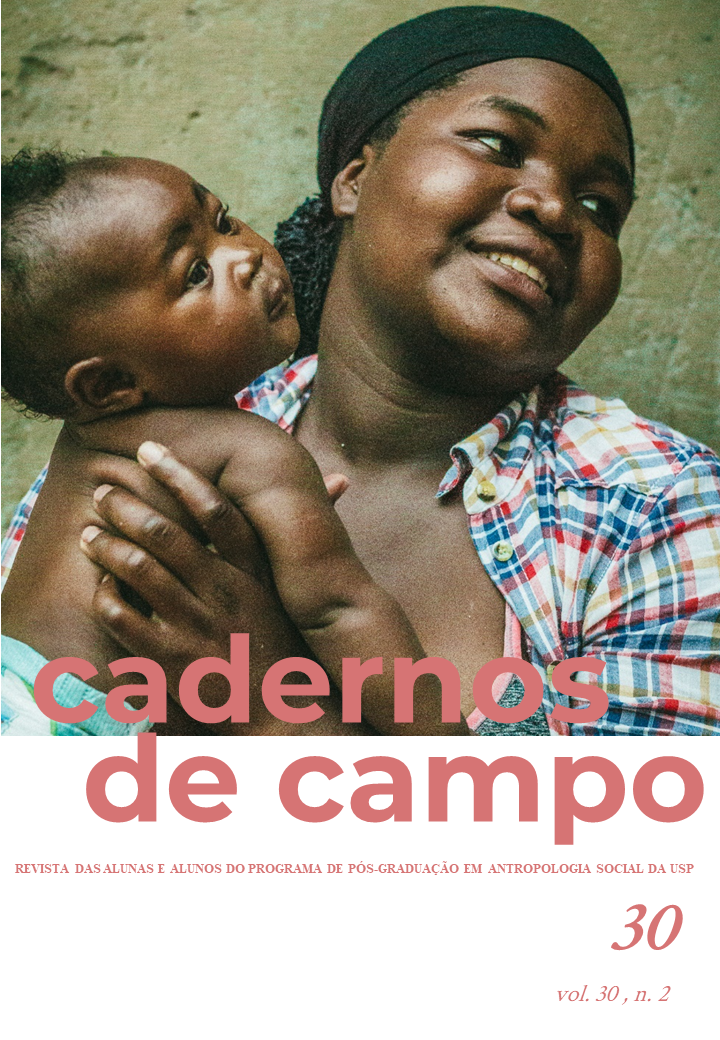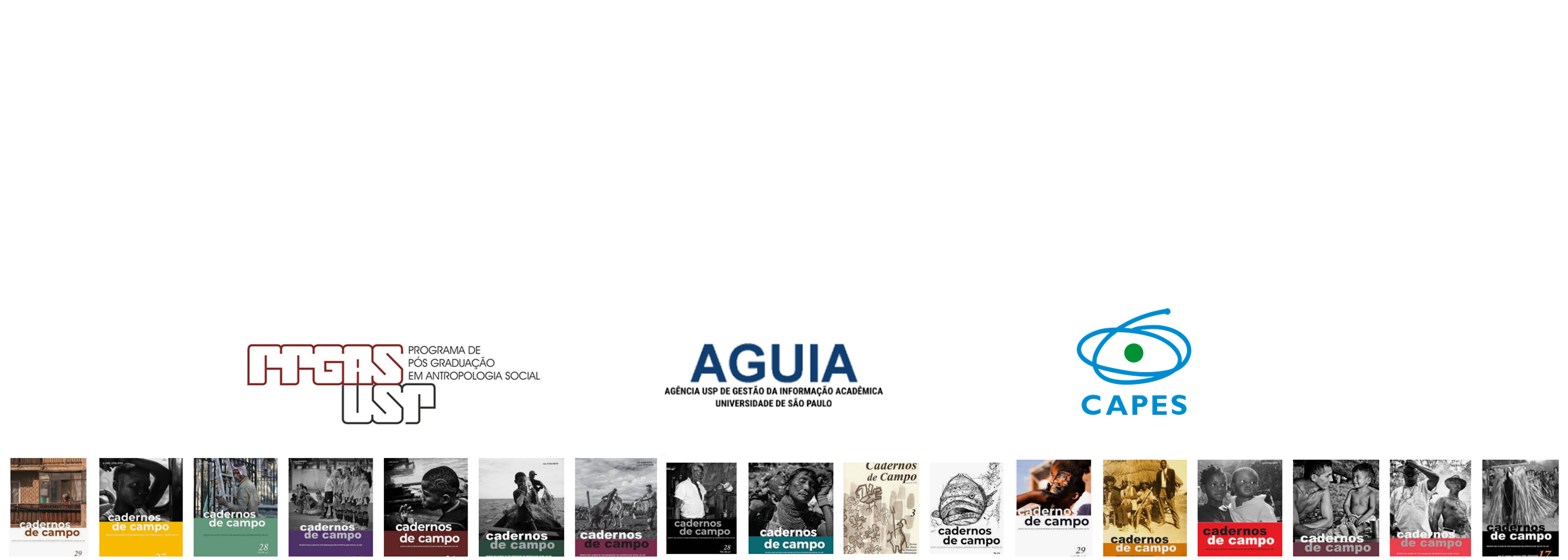Nangui tereka, hablando duro en la vida política de las mujeres Waorani
DOI:
https://doi.org/10.11606/issn.2316-9133.v30i2pe193463Palavras-chave:
Falar duro, Liderança feminina, Amazônia, WaoraniResumo
Este artigo explora a participação das mulheres Waorani da Amazônia equatoriana, no que elas reconhecem como vida política. Essa noção, em comunidades localizadas perto de estradas de petróleo, refere-se a reuniões e negociações com Outros. A vida política local, nessas comunidades, é uma expressão da resistência Waorani diferente, embora complementar, das grandes manifestações antiextrativistas que têm chamado a atenção da opinião pública e de pesquisadores. O artigo contribui para os estudos de liderança na Amazônia explorando um discurso denominado nangui tereka (falar duro), uma arte aperfeiçoada por várias mulheres Waorani. Falar duro é uma forma de expressar força ou coragem (piñe, pienguimamo), que é cultivada ao longo da vida por meio de uma série de práticas corporais intergeracionais.
Downloads
Referências
Alès, C. (2003). Función simbólica y organización social. Discursos rituales y política entre los Yanomami. In C. Alès & J. Chiappino (Eds.), Caminos Cruzados. Ensayos en Antropología Social, Etnoecología y Etnoeducación (pp. 197–240). IRD Editions.
Århem, K. (2000). From Longhouse to Village: Structure and Change in the Colombian Amazon. In K. Århem (Ed.), Ethnographic puzzles : essays on social organization, symbolism and change /Kaj Århem. (pp. 55–92). London : Athlone.
Bravo Díaz, A. (2020). Notas Amazónicas frente a la pandemia, el caso Waorani en Ecuador. Revista Periferia, 25(2). https://doi.org/https://doi.org/10.5565/rev/periferia.742
Bravo Díaz, A. (2021). “Sumak kawsay Is Harmful for All of Us” Oil Roads and Well-being among the Waorani in Ecuadorian Amazonia. Latin American Perspectives, 48(3), 51–68.
Brightman, M. (2007). Amerindian Leadership in Guianese Amazonia. Doctoral dissertation, Cambridge: Cambridge University.
Brightman, M. (2016). The imbalance of power : leadership, masculinity and wealth in the Amazon. New York : Berghahn.
Clastres, P. (1987). Society against the state : essays in political anthropology (R. Hurley & A. Stein (eds.)). Zone Books.
Conklin, B. (1997). Body paint, feathers, and VCRs: Aesthetics and authenticity in Amazonian activism. American Ethnologist, 24(4), 711–737.
Gallois, D. (2002). “Nossas falas duras”. Discurso político e auto-representação Waiãpi. In B. Albert & A. Ramos (Eds.), Pacificando o branco: cosmologias do contato no norteamazônico (pp. 205–237). Editora UNESP.
Guzmán-Gallegos, M. (2015). Amazonian Kichwa Leadership:: The Circulation of Wealth and the Ambiguities of Mediation (F. Santos-Granero (ed.)). University of Arizona Press.
High, C. (2007). Oil development, indigenous organisations, and the politics of egalitarianism. Cambridge Anthropology, 26(2), 34–46.
High, C. (2010). Warriors, hunters, and Bruce Lee: Gendered agency and the transformation of Amazonian masculinity. American Ethnologist, 37(4), 753–770. https://doi.org/10.1111/j.1548-1425.2010.01283.x
High, C. (2018). Bodies that speak: Languages of differentiation and becoming in Amazonia. Language and Communication, 63, 65–75. https://doi.org/10.1016/j.langcom.2018.02.005
Lévi-Strauss, C. (1944). The Social and Psychological Aspect of Chieftainship in a Primitive Tribe: the Nambikuara of Northwestern Mato Grosso. York, Transactions of the New Academy of Science, 7, 16–32.
Nahum-Claudel, C. (2018). Vital diplomacy : the ritual everyday on a dammed river in Amazonia / by Chloe Nahum-Claudel. New York .
Narváez, R., & Trujillo, P. (2020). Tiempos de guerra y tiempos de paz continuum simbólico de un pueblo de reciente contacto el caso etnográfico de los waorani en la amazonía ecuatoriana. Cadernos de Campo, 29(1), 13–37. https://doi.org/10.11606/issn.2316-9133.v29i1p13-37
Overing, J., & Passes, A. (2000). Introduction. In J. Overing & A. Passes (Eds.), The Anthropology of Love and Anger : The Aesthetics of Conviviality in Native Amazonia (pp. 1–30). Routledge.
Passes, A. (2004). The place of politics: powerful speech and women speakers in everyday Pa’ikwené (Palikur) life. The Journal of the Royal Anthropological Institute, 10(1), 1–18. https://doi.org/10.1111/j.1467-9655.2004.00177.x
Rival, L. (2002). Trekking through history : the Huaorani of Amazonian Ecuador. Columbia University Press.
Rival, L. (2005). The attachment of the soul to the body among the Huaorani of Amazonian Ecuador. Ethnos, 70(3), 285–310. https://doi.org/10.1080/00141840500294300
Sempértegui, A. (2019). Indigenous Women’s Activism, Ecofeminism, and Extractivism: Partial Connections in the Ecuadorian Amazon. Politics and Gender, . https://doi.org/10.1017/S1743923X19000023
Sempértegui, A. (2020). Decolonizing the Anti-Extractive Struggle: Amazonian Women’s Practices of Forest-Making in Ecuador. Journal of International Women’s Studies, 21(7), 118–134.
Uzendoski, M. A. (2018). Amazonia and the cultural politics of extractivism: Sumak Kawsay and Block 20 of Ecuador. Cultural Studies, 32(3), 364–388. https://doi.org/10.1080/09502386.2017.1420095
Vallejo, I., & García-Torres, M. (2017). Mujeres indígenas y neo-extractivismo petrolero en la Amazonía centro del Ecuador: Reflexiones sobre ecologías y ontologías políticas en articulación. Brújula (Enfoques), 11(1), 1–43.
Viveiros de Castro, E. (1996). Images of Nature and Society in Amazonian Ethnology. Annual Review of Anthropology, 25(1), 179–200. https://doi.org/10.1146/annurev.anthro.25.1.179
Zanotti, L. (2012). Resistance and the politics of negotiation: women, place and space among the Kayapó in Amazonia, Brazil. Gender, Place & Culture: A Journal of Feminist Geography, 20(3), 346–362.
Downloads
Publicado
Edição
Seção
Licença
Copyright (c) 2021 Cadernos de Campo (São Paulo - 1991)

Este trabalho está licenciado sob uma licença Creative Commons Attribution-NonCommercial-ShareAlike 4.0 International License.
Autorizo a Cadernos de Campo - Revista dos Alunos de Pós-Graduação em Antropologia Social da Universidade de São Paulo (PPGAS-USP) a publicar o trabalho (Artigo, Ensaio, Resenha,Tradução, Entrevista, Arte ou Informe) de minha autoria/responsabilidade assim como me responsabilizo pelo uso das imagens, caso seja aceito para a publicação.
Eu concordo a presente declaração como expressão absoluta da verdade, também me responsabilizo integralmente, em meu nome e de eventuais co-autores, pelo material apresentado.
Atesto o ineditismo do trabalho enviado.





 eISSN: 2316-9133
eISSN: 2316-9133